外研版英语七年级上册《Unit 1 The first English lesson》课件
- 格式:ppt
- 大小:1.59 MB
- 文档页数:18
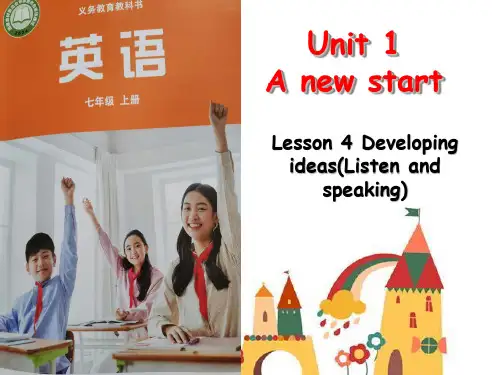
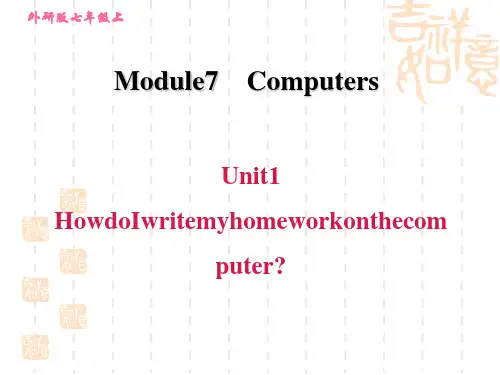

最新外研版七年级上册英语短语归纳总结最新外研版七年级上册英语短语归纳总结Mdule 11. ce fr来自 be fr 来自2. Nice t eet u.很快乐见到你3.Welce t 欢送来到4. Class One Grade Seven 七年级一班5. the capital f …的首都.省会6. fail nae 姓 given nae 名 first nae 名 last nae 姓Mdule 21.n the left 在左边2. n the right 在右边3. next t 在…隔壁4. in frnt f 在…前面5. behind 在…后面6.at the sae hspital 在同一家医院7.What a big fail! 好大的家庭啊!8.What’s ur father’s b?= What des ur father d? 你父亲的'职业是什么?9. a pht f sb.某人的照片Mdule 31.there be 某地有某物2. a lt f = lts f = an = uch 许多〔后跟可数名词复数及不可数名词〕3. atin the frnt f在…内部的前面4. a ap f the Be B:Be.See u trrA:What clur are the apples? B:The are red. 19.A:What da is it tda? B:It’s Mnda.A:What da is it trr 如今到走的时间了。
6. See u trr 无论如何,如今是回学校的时间了。
Mdule 10 Spring Festival【短语归纳】1.Spring Festival春节 2 .ae lantern:扎灯笼3.lea .dragn danee学舞龙4 .clean the huse 清扫房子 5.:5。
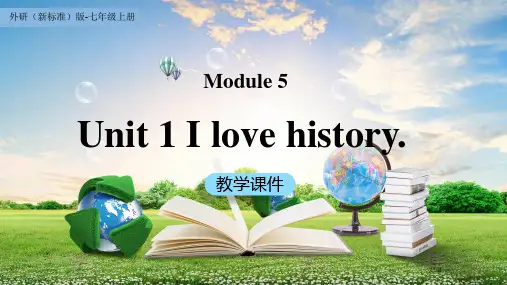
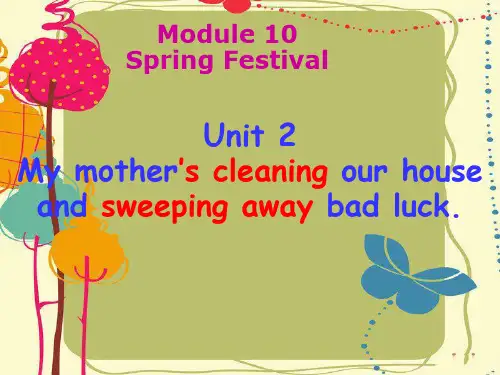
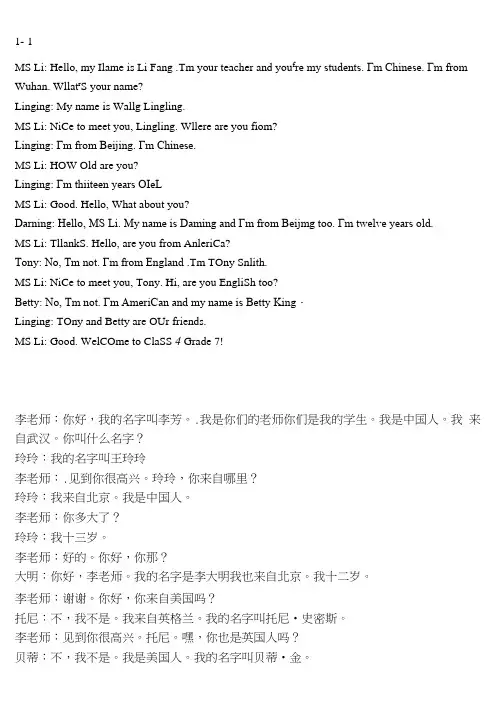
1-1MS Li: Hello, my Ilame is Li Fang .Tm your teacher and you f re my students. Γm Chinese. Γm from Wuhan. Wllat r S your name?Linging: My name is Wallg Lingling.MS Li: NiCe to meet you, Lingling. Wllere are you fiom?Linging: Γm from Beijing. Γm Chinese.MS Li: HOW Old are you?Linging: Γm thiiteen years OIeLMS Li: Good. Hello, What about you?Darning: Hello, MS Li. My name is Daming and Γm from Beijmg too. Γm twelve years old.MS Li: TllankS. Hello, are you from AnleriCa?Tony: No, Tm not. Γm from England .Tm TOny Snlith.MS Li: NiCe to meet you, Tony. Hi, are you EngliSh too?Betty: No, Tm not. Γm AmeriCan and my name is Betty King・Linging: TOny and Betty are OUr friends.MS Li: Good. WelCOme to ClaSS 4 Grade 7!李老师:你好,我的名字叫李芳。
.我是你们的老师你们是我的学生。
我是中国人。
我来自武汉。
你叫什么名字?玲玲:我的名字叫王玲玲李老师:.见到你很高兴。
玲玲,你来自哪里?玲玲:我来自北京。
我是中国人。

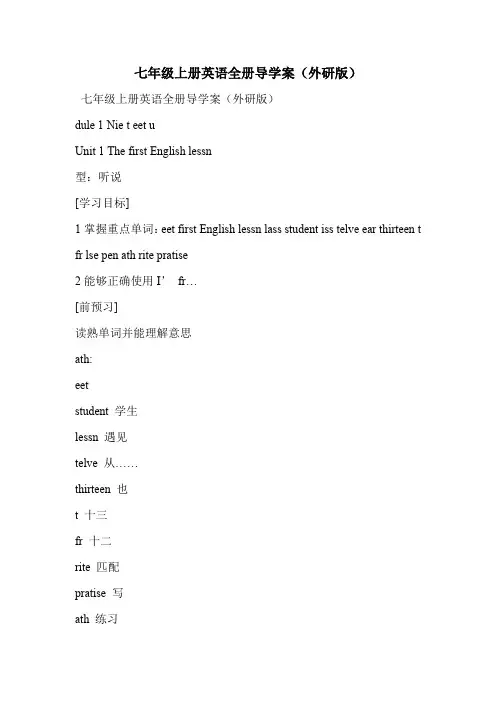
七年级上册英语全册导学案(外研版)七年级上册英语全册导学案(外研版)dule 1 Nie t eet uUnit 1 The first English lessn型:听说[学习目标]1掌握重点单词:eet first English lessn lass student iss telve ear thirteen t fr lse pen ath rite pratise2能够正确使用I’fr…[前预习]读熟单词并能理解意思ath:eetstudent 学生lessn 遇见telve 从……thirteen 也t 十三fr 十二rite 匹配pratise 写ath 练习[堂活动]Step 1检查1)Listen and he h an peple spea1 □2 □3 □2)L at the piture hih rds an u use t desribe the piture?hinese lass father friend ther shl student teaherStep 2 Listening1)Listen and he the true sentenes1iss Li is a teaher □2Lingling is fr Beiing □3 Daing and Lingling are friends □4 Daing and Lingling are English □ang Hui is telve ears ld □2)Listen and fill in the blansiss Li: Hell nae’s iss Li I’a teaher and I’hinese I’____ uhanhat’s ur nae? here are u fr?Lingling: nae’s Lingling I’fr Beiing I’_____ ears ld and I’hinese This is Daing He’s friend e’re studentsDaing: Hell nae’s Daing I’a _______and I’telve ears ld I’fr Beiing Lingling is friend hat’s ur nae?ang Hui: nae’s ang Hui I’______ears ld I’fr Shanghai and I’a student I’hinese I’in lass neiss li: Nie t_____ u, ang Huiang Hui: Nie t eet u, ______Step 3 Read quil and fill in the frNaeAgebituntriss LiLinglingDaingang HuiStep 4 Speaing1、r in pairs As and anserA: hat’s ur nae? B: nae’s…A: here are u fr? B: I’fr…A: Nie t eet u,… B: Nie t eet u ,t2、Intrdue urself t lass Using these ashinese nae is Ni Shihun English nae is harltte I’ an Eng lish teaheru an all e iss /s Ni I’ 39 ears ld I’ fr Beiing, hina I’ hinese I teah in Beiing N80 unir High Shl Gu’re students e’re gd friendsReeber these language pints:1)_ hinese / English nae is…2)_I’ a student 3)_I’ …ears ld 4)_I’ fr…)_I stud in … unir High Shl6)_e’re ur students7)_e’re gd friends, tStep Vabular and prnuniatin(Ativit 6,7,8)1、Listening and repeat (Ativit 6)1)Listen arefull 2)Repeat after the tape2、Listening and repeat (Ativit 7)First,read alud; Then,repeat after the tape总结s在单词末尾的读音。
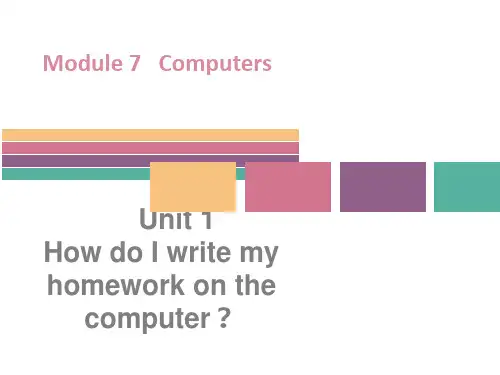
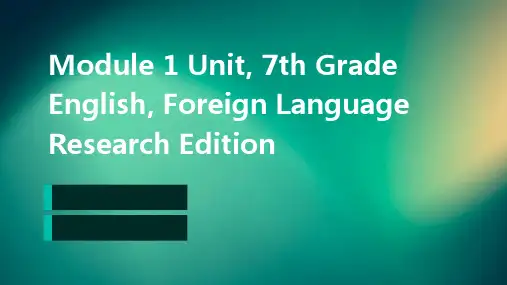
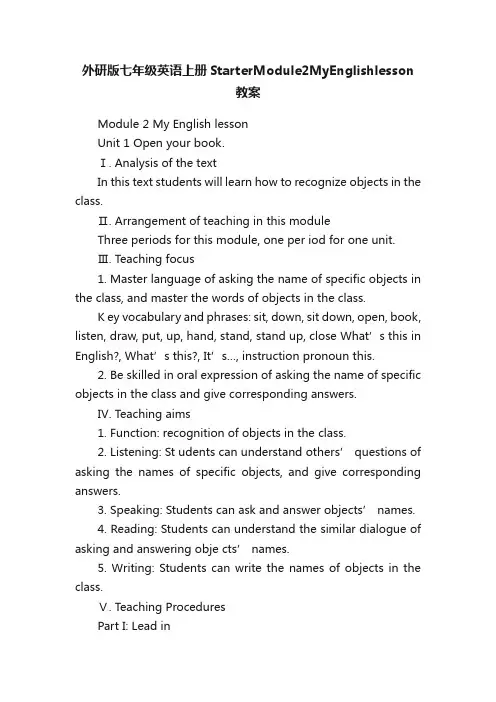
外研版七年级英语上册StarterModule2MyEnglishlesson教案Module 2 My English lessonUnit 1 Open your book.Ⅰ. Analysis of the textIn this text students will learn how to recognize objects in the class.Ⅱ. Arrangement of teaching in this moduleThree periods for this module, one per iod for one unit.Ⅲ. Teaching focus1. Master language of asking the name of specific objects in the class, and master the words of objects in the class.K ey vocabulary and phrases: sit, down, sit down, open, book, listen, draw, put, up, hand, stand, stand up, close What’s this in English?, What’s this?, It’s…, instruction pronoun this.2. Be skilled in oral expression of asking the name of specific objects in the class and give corresponding answers.Ⅳ. Teaching aims1. Function: recognition of objects in the class.2. Listening: St udents can understand others’ questions of asking the names of specific objects, and give corresponding answers.3. Speaking: Students can ask and answer objects’ names.4. Reading: Students can understand the similar dialogue of asking and answering obje cts’ names.5. Writing: Students can write the names of objects in the class.Ⅴ. Teaching ProceduresPart I: Lead inStep 1: Review the greeting phrases in the previous period by having the whole class play the dialogue in real situation.Step 2: Ask some students to introduce their partners to the class.Step 3: Enjoy a song: Hello and how are you?Part II: Vocabulary studyStep 1: Show some pictures of objects in the class by PPT, give students the names of the objects.Step 2: Play the recording and have them point out the words and phrases in Activity 1.Step 3: Listen and read.Good morning, class.Good morning, Miss Zhou.Please s it down.Step 4: Play the recor ding and have them point out the words and phrases in Activity 2.Sit down.Open your bookListen.Draw.Put up your hand.Stand up.Close your book.Step 5: Play the recording again and have them read after the tape.Step 6: Listen again and do.Part Ⅲ: Dialogue studyStep 1: Teacher ask the whole class the objects in the PPT’s names.Step 2: Match the expressions in Activity 3.1. Put up a) your book2. Open b) …down3. Stand c)… up4. Sit d)…your hand.Step 3: Check the answers.Keys: 1. d 2. a 3. c 4. bStep 4: Write the letters in Activity 5.Step 5: Listen and check.Step 6: Work in pairs, one student point one object in the PPT, the other answer the question.Step 7: Work in pairs and fill the blanks in Activity 6. Have some of them to perform the dialogue for the whole class.Stand up.Yes.Open your book.Yes.Step 8: Work in pairs. Say and do.Unit 2 What’s your number?Ⅰ. Analysis of the textIn this text students will learn how to express English number.Ⅱ. Arrang ement of teaching in this moduleThree periods for this module, one period for one unit.Ⅲ.Teaching focusKey vocabulary and phrases: student, new, here, in, one, two, three, four, five, six, seven, eight, nine, ten, telephone, number Ⅳ. Teaching aims1. Function: recognition of numbers.2. Listening: Students can understa nd others’ questions of asking numbers, and give corresponding answers.3. Speaking: Students can ask and answer numbers.4. Reading: Students can understand the similar dialogue of asking and answering numbers.5. Writing: Students can write numbers.Ⅴ. Teaching ProceduresPart I: Vocabulary studyStep 1: Learn English number from one to ten.Step 2: Enjoy a song: Ten little Indians.Part II: Listening practice.Step 1: Look at the pictures in Activity 1.Step 2: Listen and read.—Hello. Are you a new student here?—Yes, I am.— What class are you in?—I’m in Class 3. Mr. Chen’s class.Ste p 3: Listen and repeat.one two three four fivesix seven eight nine tenStep 4: Listen and chant.One, two, three, four, five.Once I caught a fish alive.Six, seven, eight, nine, ten,Part III: Dialogue studyStep 1: Ask the students to read the conversation silently.Step 2: Play the recording and ask the students to listen and read the conversation. Step 3: Read the conversation.Step 4: Act it out.Step 5: Language pointsWhat’s your telephone number?What’s your telephone number? 用于询问对方的电话号码,回答时用“It’s +电话号码.”结构。
初中英语外研版七年级上册高效课堂资料课时作业(十九)Module 7 Unit 1设计人:红河镇中学:李子昌(20分钟50分)Ⅰ. 根据句意及汉语提示完成单词(5分)1. —What time can I(打印)those documents?—At nine am.2. The girl(保存)her email and walks out of the room.3. Tony works hard and(最后)he goes to college(大学).4. You can use the mouse and(点击)“new document”.5. (打开)the TV on. I want to watch the basketball match.Ⅱ. 用所给词的适当形式填空(5分)1. (open)a new document, please.2. There are lots of(mouse)in the field(田野).3. Nick usually(not use)the Internet to do his homework.4. Please give me some(paper). I want to draw some pictures.5. (one), Jimmy opens a new document.Ⅲ. 单项选择(10分)1. I can write my homework the computer.A. onB. inC. atD. with2. This is Jim Green. Jim is his name.A. oneB. firstC. the firstD. the one3. —the printer?—It’s on the table over there.A. How’sB. Where’sC. When’sD. What’s4. It’s very hot today. What about to swim?A. goingB. goC. to goD. to going5. Please the computer to the printer.A. writeB. printC. connectD. switchⅣ. 完成句子(10分)1. 我经常在电脑上写作业。